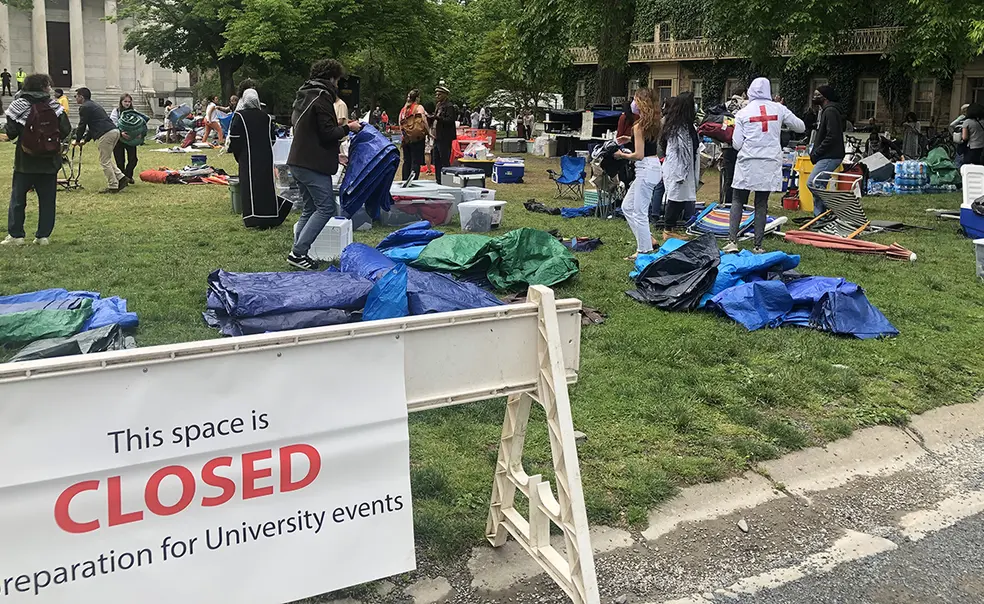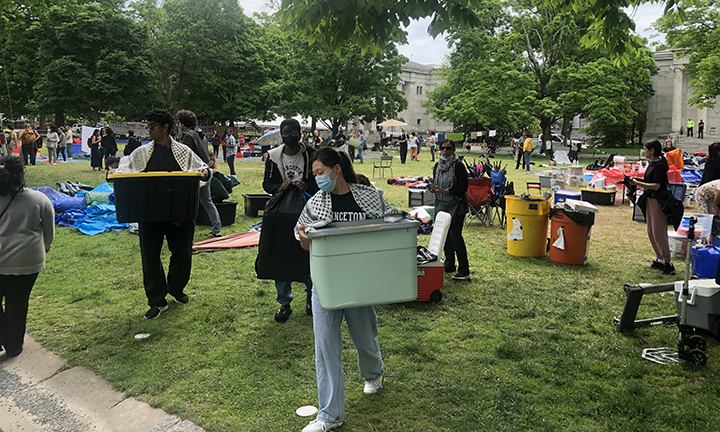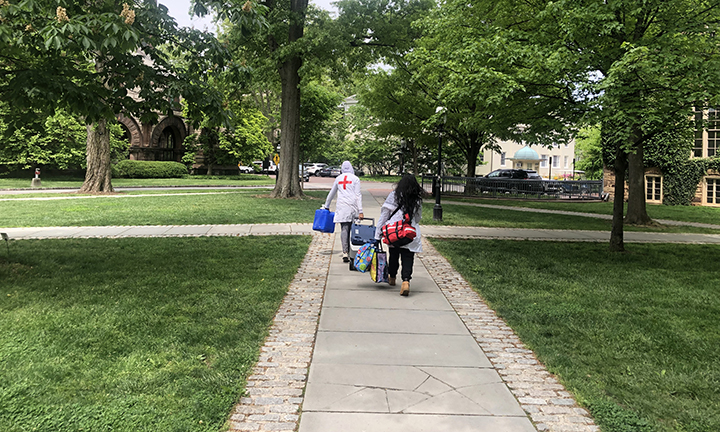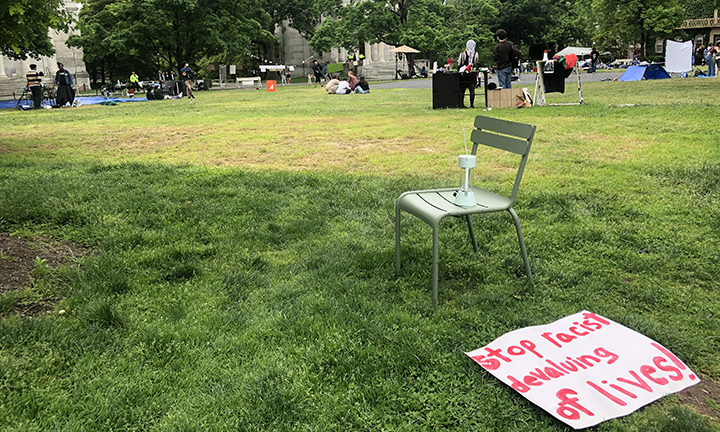Pro-Palestinian Protesters Clear Encampment From Cannon Green
Responding to the University’s directive to vacate spaces before end-of-year events, the protesters said: ‘Our demands remain the same’
This story has been updated from its original version.
The pro-Palestinian encampment was gone from Cannon Green by Thursday morning. Protesters had slowly begun clearing it on Tuesday, May 14, after signs appeared around the area reading, “This space is CLOSED in preparation for University events,” and workers began installing lighting for Class Day.
Protesters held a rally Wednesday night and marched past both Cannon Green and the encampment’s original location in McCosh Courtyard. In a statement, they called their “student intifada” not a camp but a movement.
“We sang, chanted, recited poetry, held each other, strengthened our movement for the future, and forced a blood-soaked institution to confront its complicity daily,” the statement says. It ends with: “See you at Reunions.”
On Monday night, President Christopher Eisgruber ’83 issued a message to the campus, saying the protesters had to clear Cannon Green and respect other common spaces as end-of-year events approach, but he did not give a deadline. According to Princeton Israeli Apartheid Divest’s statement, Public Safety had a “series of purposefully opaque interactions” with protesters before telling them Tuesday morning they needed to begin decamping immediately.
Eisgruber’s directive regarding Cannon Green came in a long update on discussions between the University administration and the group, which began its encampment April 25.
Divestment, dissociation, and proposals for academic affiliations with Palestinian scholars will be considered through the usual channels, Eisgruber wrote. The University is offering to convene a working group on the experience of Palestinian students, staff, and faculty at Princeton, and it’s considering a “restorative justice” option for students facing disciplinary action that would allow them to graduate.
In response to a request for an affinity space for Palestinian students, Eisgruber noted there is already one for Middle Eastern, North African, and Arab students at Princeton.
On Instagram Monday night, the protesters quoted the part of Eisgruber’s email that said: “We could not accommodate, for example, requests for severing ties from the United States military, academic boycotts of Israel, ceasefire statements, or complete amnesty for arrested protestors without breaching principles fundamental to the University’s governance and mission.” Next to it, the protesters wrote: “Our demands remain the same.”
From the beginning of the encampment, the protesters have listed demands in line with other pro-Palestinian camps at colleges across the country: For Princeton to divest from companies that “profit from or engage in the State of Israel’s ongoing military campaign” in Gaza, end any research on “weapons of war” funded by the U.S. Department of Defense, boycott Israeli institutions, support Palestinian academic and cultural institutions, and advocate for a ceasefire in Gaza. They say Princeton’s investments make the University complicit in genocide.
“Eisgruber has decided that some historical crises warranted a statement, such as Oct. 7 and the beginning of the war in Ukraine,” Emanuelle Sippy ’25, president of the Alliance of Jewish Progressives on campus, said in the protest group’s May 11 press release. “I find it morally bankrupt that the University cannot acknowledge the immense devastation and loss of Palestinian life.”
Marches, rallies, and disagreements with the administration have marked the days since the encampment began. Some demonstrations, such as a hunger strike begun by 13 protesters, have made headlines in major news media like The New York Times. Others, such as Princeton High School students visiting to show solidarity, have only made splashes closer to home. Social media messages and open letters have flown fast and furious.
For example, the protesters’ attempt on April 29 to occupy Clio Hall — resulting in trespassing summons for 13 people, mostly students — led to a flurry of messages online. Vice President for Campus Life Rochelle Calhoun wrote to the student body that the occupation had been dangerous and abusive to the staff who work in Clio, and then a group of faculty members penned an open letter calling for her resignation.
“If anything, your recourse to the contrived imperative of ‘maintaining public order’ with the help of law enforcement agencies — a textbook colonial discourse and tactic still abundantly employed by authoritarian states — has only brought disorder and disturbance to an otherwise entirely organized and peaceful student-led protest movement,” the letter states.
On May 7, President Christopher Eisgruber ’83 said in his own letter to the campus that he heard from some that the Clio Hall protesters are “caring, talented people,” but also from staff members who were present and terrified when the building was occupied and surrounded.
“As the protest activity and rhetoric has intensified, I have heard from members of our community who say that they feel less welcome or secure on campus because they are encountering antisemitic language and behavior that should have no place at Princeton,” Eisgruber wrote.
“Some people believe we are tolerating too much protest on the campus and some that we are not tolerating enough.”
Meanwhile, the hunger strike that began May 3 sent at least one participant to the hospital while garnering ridicule from social media users and conservative media outlets. The New York Post, for example, called one striker a “Princeton princess,” describing her as “whining” in a video where protesters said they were starving but the University wouldn’t help them.
Some faculty members joined the hunger strike for a 24-hour period at the end of last week. On May 8, the strikers issued a letter saying they were experiencing weight loss, critically low blood pressure, and other health problems; on May 13, they quit and were replaced by seven new hunger strikers.
A special meeting of the faculty is scheduled for May 20. The six faculty members who requested it have six proposals, but Eisgruber said in a memo to the faculty that only one — granting amnesty to the protesters — will be discussed. The rest — including divestment and resolutions calling for a ceasefire in Gaza and boycotts of Israel — may not be in the jurisdiction of the faculty, and even for amnesty, “there are questions about the scope of the faculty’s authority over the matters addressed by that item.”
Alumni have supported the pro-Palestinian protests at Princeton in a variety of ways, speaking and joining protesters on campus, arranging for food and supplies, and signing a petition to advocate for the students who were arrested and now face University disciplinary charges.
Sandy Rea ’69 was among a small group of alumni who visited protesters on April 29, prior to the Clio Hall sit-in. In the 1980s, Rea taught elementary school for a year at a Quaker school in Ramallah, in the West Bank — an experience that he said “cemented the Palestinians in my heart.”
“More than anything, because of the hatred and the fear that’s been generated on both sides of the issue, we just have to listen to each other — and that’s not easy,” Rea told PAW.













No responses yet